Posted February 6, 2021 by Nicky in Reviews / 2 Comments
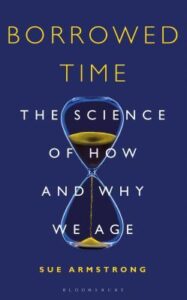 Borrowed Time: The Science of How and Why We Age, Sue Armstrong
Borrowed Time: The Science of How and Why We Age, Sue Armstrong
I’ve read one of Sue Armstrong’s books before, on the role of the p53 gene in cancer, so despite aging and the science thereof not really being my thing, I thought I’d give it a try. And it was, in fact, riveting. I knew a little about some of the experiments — I read a paper on sirtuins and resveratrol for my final exam of my BSc, so that gave me some extra context — but much of the detail was new to me, and Armstrong explains things beautifully and keeps things very clear.
The answer to the question of how and why we age is, of course, “lots of ways and lots of reasons”, and the science isn’t all the way yet on understanding exact mechanisms and unpicking the many small effects that can add up over a lifetime. Armstrong avoids giving any false certainty, but makes it clear how people in the know expect things to go, and what they’re cautious about. Unlike some writers, she doesn’t intrude a lot into the narrative (we don’t have to hear stories about her neighbour’s sister’s dog’s brother, which some science writers lean on a bit too heavily), or when she does it feels relevant and useful to understand where she stands.
For a field with so many different puzzle-pieces, Armstrong really brings it together well, and I actually found myself reading this all in one day, in great big chunks. Now that’s good science writing!
Rating: 4/5
Tags: book reviews, books, non-fiction, science, Sue Armstrong
Posted February 6, 2021 by Nicky in Reviews / 0 Comments
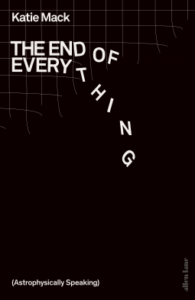 The End of Everything, Katie Mack
The End of Everything, Katie Mack
The End of Everything is about all the potential ways the universe can end. Katie Mack describes the various scenarios and why they’re likely or unlikely, the evidence for them, and what looking into these possibilities can teach us about the universe, even if they all turn out to be wrong. She has a fairly breezy style, but some of the actual physics is pretty hard to understand, so it’s to her credit that it feels comparatively light while also making what she describes clear enough.
Unfortunately, for me, physics is one of those topics that I don’t dislike because it’s hard — though I do find it to be difficult — as because it leaves me very much wondering what the point of everything is. Even biology will leave me feeling that way once I dig too deep, and this isn’t a dig at Mack at all… but it definitely made it harder for me to enjoy this book, because it does deal with those really big topics, and where some people can take joy in all the unknowns and the deep weirdness that we manage to exist at all, it really gets under my skin and makes me feel very small and pointless. I can’t really recommend that as an experience, but if entropy doesn’t get you down and a cold empty universe doesn’t bother you, then this will be much more to your taste!
Rating: 3/5
Tags: book reviews, books, Katie Mack, non-fiction, science
Posted February 4, 2021 by Nicky in Reviews / 0 Comments
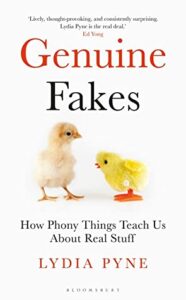 Genuine Fakes: How Phony Things Teach Us About Real Stuff, Lynda Pyne
Genuine Fakes: How Phony Things Teach Us About Real Stuff, Lynda Pyne
I didn’t really expect this book to be so riveting, but it really was. The central idea is a bit shaky, because Lynda Pyne’s definition of “genuine fakes” is very, very elastic: one example is lab-created diamonds, another is the Spanish Forger’s faked medieval illustrations, another is the faked Archaeoraptor fossil… The things that make each item “genuine” or “fake” are pretty flexible. The reasoning is most solid when it comes to art like the Spanish Forger’s work, which has now become desirable in and of itself. The reasoning for the Archaeoraptor fossil is basically “well, it’s made up of real fossils!” Yeah, who cares, those fossils have been ripped from their original correct context in a desperate attempt to deceive people and get more money. That’s not a genuine fake, that’s just a fake.
And then there’s a bit about wildlife documentaries and how they’re kind of fake (sometimes, depending on how they’re filmed) and kind of not, and the point kind of dissipated somewhere in there for a while in favour of just explaining how much money it takes to create a documentary like Blue Planet II.
That all said, though, even if Pyne’s examples don’t all hang together, I enjoyed her dissection of each item and the things it has to tell us. I didn’t know anything about the Spanish Forger before, and that was maybe my favourite thing to learn about. Interesting stuff here, just… not really very organised.
Rating: 3/5
Tags: book reviews, books, history, Lynda Pyne, non-fiction, science
Posted January 28, 2021 by Nicky in Reviews / 0 Comments
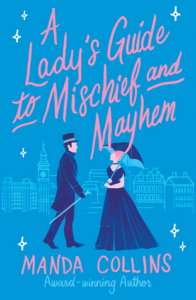 A Lady’s Guide to Mischief and Mayhem, Manda Collins
A Lady’s Guide to Mischief and Mayhem, Manda Collins
A Lady’s Guide to Mischief and Mayhem is a light mystery-romance, where the romance feels like the more important element of the two. Kate Bascomb is a reporter, the owner of a newspaper she took over after her husband died, and she’s determined to champion women and shine a light on things women are kept sheltered from in England of 1865. Andrew Eversham is a detective inspector, and her investigative reporting endangers his career as she quickly finds a witness his team entirely neglected to speak to, with crucial evidence about a string of murders.
Naturally, the two get drawn together personally, particularly after the killings start getting very close to Kate, who discovers a body while on a visit to a friend’s country home. The murders were confined to London at first, but suddenly they seem to have followed her… and thus so does Eversham. The sparks of attraction between them are very obvious, and this was the shakiest part of the book for me: they leapt from lust to love in mere pages, with very little provocation. I’d expected a bit more will-they-won’t-they, but it was remarkably straightforward. At least they mostly managed to communicate like adults, which can be a big bugbear for me.
I thought it was light and frothy and fairly inconsequential, and for the most part, I was fine with that. Kate and her friend Caro were fun, and I appreciated the friendship between Kate and Val, as well — I was very relieved when there was no sign of sexual interest or jealousy on either of them’s part, and their quasi-sibling relationship was rather fun. Much of the setting and characters are sketched in fairly lightly; historical fiction this is not, if that’s what you’re hoping for… and the mystery was fairly light too.
When I try to sum it all up, it all seems pretty thin and like I’m damning it with faint prize, but it was a genuinely fun reading experience, and a nice way to spend my day, picking it up here and there to read a chapter whenever I could. It’s unlikely to stick in my head, but I’d happily read another Manda Collins book or even another book in this series.
Rating: 3/5
Tags: book reviews, books, crime, Manda Collins, mystery, romance
Posted January 28, 2021 by Nicky in General / 1 Comment
Greetings, folks! It’s still Wednesday until I’ve slept, right?
 What are you currently reading?
What are you currently reading?
Fiction: Abaddon’s Gate, by James S.A. Corey. I’m now nearing the end of my reread of this one, and the next one (Cibola Burn, I think?) will be entirely new to me, so that’s going to be interesting.
Non-fiction: I picked up Genuine Fakes, by Lynda Pynes yesterday; it’s an interesting book; a bit scattershot in its approach (a fake fossil made up of four genuine fossils is not [yet?] a genuine fossil in anything like the same way as a piece of art by the Spanish Forger has become a collectable item in its own right), but engaging. Funny how some of my most random book choices turn out to be the most engaging, while A World Beneath the Sands (Toby Wilkinson) is a bit of a grind, despite being one of my usual interests.
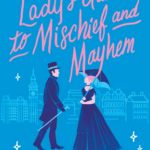 What have you recently finished reading?
What have you recently finished reading?
A Lady’s Guide to Mischief and Mayhem, by Manda Collins. Frothy and light, not too consequential, and relatively predictable… which makes it exactly what I wanted to read right now. Bit like the Veronica Speedwell books in some ways, though the heroine is a reporter rather than a scientist.
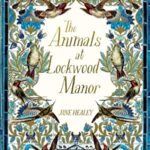 What will you be reading next?
What will you be reading next?
As ever, it’s anyone’s guess. The Mask of Mirrors (Alyc Helms and Marie Brennan writing as M.A. Carrick) has arrived, so that’s a possibility… but The Animals at Lockwood Manor is on my five-book shortlist — which I haven’t touched for weeks and weeks, argh, clearly it needs a refresh — and is actually starting to pique my interest. Also I’m kind of in a non-fiction mood, and there’s a couple of books I got for Christmas that might tempt me there.
What are you reading, folks?
Tags: Alyc Helms, books, James S.A. Corey, Jane Healey, Lynda Pynes, M.A. Carrick, Manda Collins, Marie Brennan, Toby Wilkinson, WWW Wednesday
Posted January 25, 2021 by Nicky in General / 2 Comments
Greetings, folks! This is very slightly late, but I’m determined to get it out of the door anyway and get back into the habit…
Books acquired:
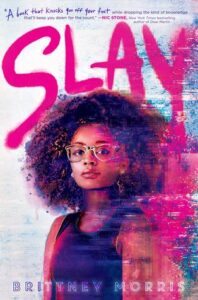
Books read this week:
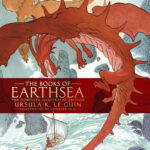

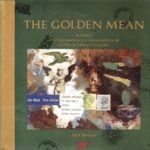
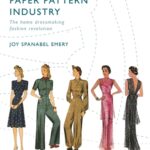

Reviews posted this week:
How’s everyone else doing? Lots of reading?
Tags: books, Stacking the Shelves, weekly roundup
Posted January 25, 2021 by Nicky in Reviews / 0 Comments
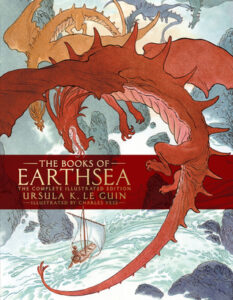 The Tombs of Atuan, Ursula Le Guin
The Tombs of Atuan, Ursula Le Guin
Again, I read this in the version illustrated by Charles Vess, this time. I noticed fewer corrections/changes in the text for this one, but perhaps I know it a little less well — though the opening chapter with the ceremony where Arha is ‘eaten’ has always stuck in my head (the drum beating at heart-pace, the ritual word that has lost all meaning) and the descriptions of the Labyrinth, the treasures of the temple… these have made a really big impression on me. As a kid, I think it was my favourite.
And that impression pretty much stayed with me. I love learning more about this part of Earthsea, seeing a whole other perspective. Though she didn’t know it yet, according to her own discussions of her writing process, so many foundations for the later books were laid here, asking new questions of what was established in the first book.
The only thing disappointing about this reread was reading Ursula Le Guin’s afterword, which feels like such an odd thing to say — but I so often agree with Ursula Le Guin that it really pulls me up short when something strikes such a discordant note for me. Here it is:
When I was writing the story in 1969, I knew of no women heroes of heroic fantasy since those in the works of Ariosto and Tasso in the Renaissance. These days there are plenty, though I wonder about some of them. The women warriors of current fantasy epics — ruthless swordswomen with no domestic or sexual responsibility who gallop about slaughtering baddies — to me they look less like women than boys in women’s bodies in men’s armor.
It sort of depends exactly what heroines Le Guin had in mind with that, but “no domestic or sexual responsibility” rings horribly to me. I enjoy the attention to domestic tasks in Le Guin’s work (Yarrow making the wheat cakes in A Wizard of Earthsea; the endless work of spinning and weaving at the Place in The Tombs of Atuan…) — and I certainly wouldn’t want Tenar to run around in armour with a sword. I think it’s important that Tenar, with those skills and her later trajectory, is a heroine… but she’s not the only kind of heroine there can be. (And a woman who wants to have “no domestic and sexual responsibility” is no less of a woman for it.)
Bit odd to end on that note, given that I dearly love The Tombs of Atuan. Still a great read.
Rating: 5/5
Tags: book reviews, books, SF/F, Ursula Le Guin
Posted January 23, 2021 by Nicky in Reviews / 0 Comments
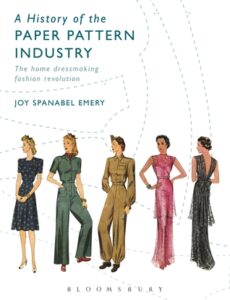 A History of the Paper Pattern Industry, Joy Spanabel Emery
A History of the Paper Pattern Industry, Joy Spanabel Emery
I don’t think this book would be of great interest to someone who isn’t interested in sewing at all, but you don’t have to actually sew to take an interest — a couple of episodes of the Great British Sewing Bee should set you up with all you need to know for background, if you feel you need to know a little more. Mostly, what you need to know is explained in the text, as the history goes through the development of early patterns from “rock of eye” to printed patterns showing various different sizes.
It seems that paper patterns have a surprising amount to tell fashion history: although paper patterns for home sewers were behind the fashion by a little, they couldn’t be that far behind or they’d be pointless, so they did follow fashion and sometimes inform it (for instance, in the length of mini-skirts). Patterns have survived well, despite the flimsy paper, because the paper was acid-free, and often systems of notches and punched holes were used instead of ink. Carefully unfolded, very old patterns are still useable and useful.
It’s surprising to me that the companies which established themselves early in the history of providing patterns for home sewers still exist! It was a little odd to meet their names back before printed patterns became possible, for instance.
The book is richly illustrated with images of the fashions and pattern-packets discussed, showing the trends through time very visually as pattern companies started putting the pattern pieces in envelopes, providing more instruction, and expanding their ranges to tempt younger sewers into following fashions. It also comes with some vintage patterns, which make no sense to me, but might interest people with a less academic interest in sewing and actually making garments.
Rating: 4/5
Tags: book reviews, books, history, Joy Spanabel Emery, non-fiction
Posted January 23, 2021 by Nicky in Reviews / 0 Comments
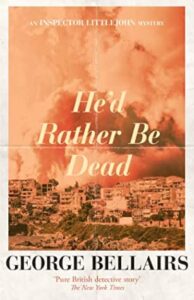 He’d Rather Be Dead, George Bellairs
He’d Rather Be Dead, George Bellairs
He’d Rather Be Dead is another of George Bellairs’ Inspector Littlejohn stories; I’m not reading them in any kind of order, just picking them up as I come across them or find them on Kindle Unlimited, and luckily that doesn’t matter — you can jump in anywhere. Littlejohn’s character doesn’t really change or develop: it’s purely about the mystery he’s investigating. In this case, it’s the death of the local Mayor, who died at a banquet surrounded by potential enemies made due to his corruption and efforts to revitalise the town in a way the inhabitants see as vulgar.
As with The Case of the Famished Parson, which I read recently, a lot of the opening detail is a red herring: the events of the banquet are relatively unimportant, and Boumphrey — who gets a decent introduction — quickly fades into the background and even becomes rather a suspicious character.
I do enjoy that with George Bellairs’ work, you can usually follow Littlejohn’s reasoning. As the evidence comes to light, the reader gets to see it too. He’s no Sherlock Holmes, all ego and long explanations of his own cleverness; he’s decent and honest, and basically what an ideal policeman should be.
The kind of odd thing with this particular instalment was that it ended with several chapters of the killer’s diary, which just went over information we already knew, in a rather florid style. It doesn’t add much, and honestly… I’d skip it. Otherwise, an enjoyable enough mystery, with George Bellairs’ usual qualities.
Rating: 3/5
Tags: book reviews, books, crime, George Bellairs, mystery
Posted January 21, 2021 by Nicky in Reviews / 0 Comments
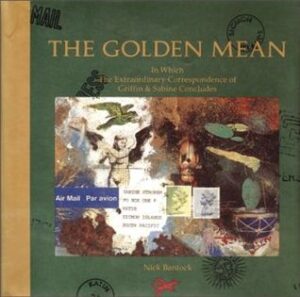 The Golden Mean, Nick Bantock
The Golden Mean, Nick Bantock
I loved The Golden Mean maybe a little bit less than the other books, even though the plot definitely advances here. It’s the end of the original trilogy, and there’s just so much that we don’t know because of the frustrating format. It makes sense that we can’t know it, but it’s still infuriating to get to the end and be left with so many questions about the story and what exactly happened. I’m very curious about that last postcard, don’t get me wrong! I’d love to read more!
But… this particular volume felt a little bit thinner, and the fact that the later books are all available second-hand only (and expensive) is really sad.
It’s still absolutely beautiful, with letters each in their own envelopes (though the envelopes are a little less well stuck to the page in this than in my copies of the first two books). It’s a lovely, tactile, multimedia experience, and I thoroughly recommend it even with its frustrations. I’ll continue reading the series when I can, though sadly it won’t be soon, unless I have a Fairy Godmother somewhere!
Rating: 4/5
Tags: book reviews, books, Nick Bantock, romance, SF/F
 Borrowed Time: The Science of How and Why We Age, Sue Armstrong
Borrowed Time: The Science of How and Why We Age, Sue Armstrong















